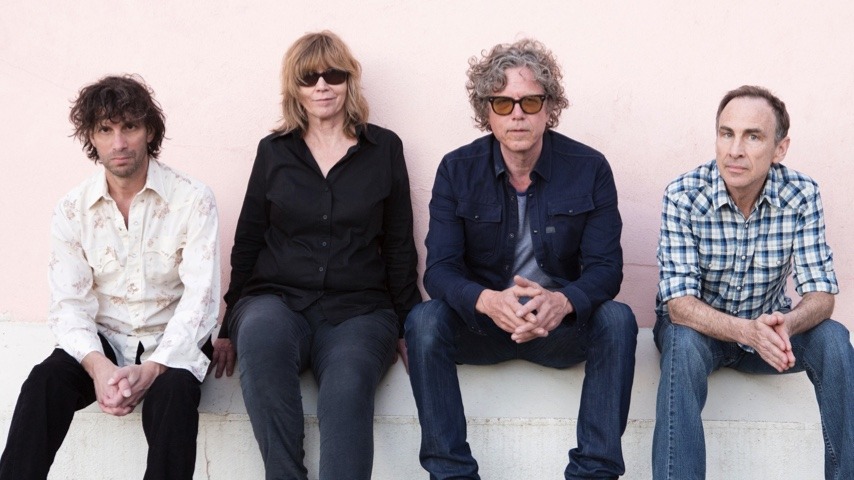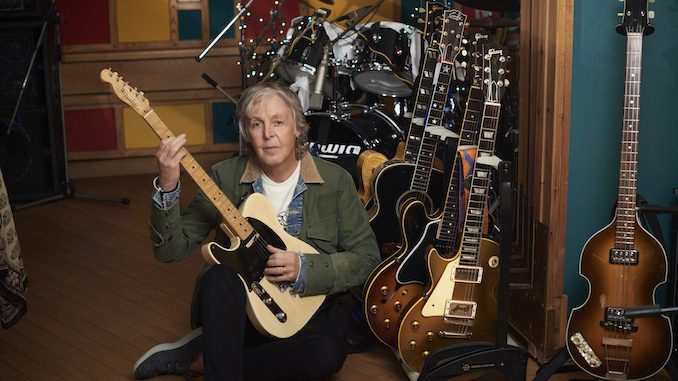Jayhawks bandleader Gary Louris had spent the year placidly sheltering in place in the Woodstock area of upstate New York, occasionally visiting his Connecticut-based son. But when we talked in the beginning of June, he’d driven back to his hometown of Minneapolis, Minn., just as Black Lives Matter protests there were reaching a violent fever pitch over the police-brutality-rooted death of local resident George Floyd.
“In the country, I did a lot of exercising, and I would walk up the nearby mountain every day,” says the singer/guitarist, who just released his latest, more collaborative Jayhawks effort XOXO at this awkward point in time, as well. “But the bears were starting to come out of hibernation just as I was leaving New York, and in nature, I learned that maybe I’m not so good at being in the country as I thought I’d be, and that I really missed the city.”
He sighs, somberly. “But today I just went up to the grocery store, and along the way, there were places closed, and half the places had carpenters out front putting in plywood to replace the broken windows and we’re not even in the heart of [the chaos]—we’re just on the fringe of it. It’s like Rodney King, all over again.”
Even his usual distraction—doing three crossword puzzles a day, starting with the definitive New York Times grid—couldn’t steal his focus from the world-reshaping events transpiring outside his door. But he and the St. Paul-situated group keyboardist/vocalist Karen Grotberg did their best to hit pause on the pandemic long enough to discuss the Eagles-twangy, harmony-rich XOXO, plus their remarkable career coup of backing Kinks legend, Sir Ray Davies for his Americana and Our Country—Americana Act II projects in 2017 and 2018, respectively, plus an attendant live “Proms in the Park” concert in London’s Hyde Park in between.
Has Louris penned any post-Covid-19 tunes yet? He’s considering it, he admits: “I’m sure there’s something there. But I’m not going to write something that that in a year will sound dated. I don’t want to be Midnight Oil!”
Paste: How did you meet Ray Davies?
Gary Louris: Well, it came through our friend and bandmate John Jackson, who we got to know when we were doing Jayhawks reissues. He’s an executive at Legacy, and he’s a big fan, to the point where he started coming to shows and sitting in. And the next thing we knew, he was playing with us. And he was also A&R-ing Ray Davies and those Americana projects, and he thought that we would be the perfect band for Ray. We were in Spain at the time, and he said, “Before going home, will you go to London and audition for Ray at Konk Studios?” And of course, we said “Yes.” And we are who we are at this point in our lives. We’re a band, and I think that’s what attracted Ray to us—the fact that we were a band. He liked the camaraderie, because it wasn’t just some assembled group of studio musicians. We had a band vibe, personally and musically, and I think for Ray, he really liked being in a band. He liked being in The Kinks.
Paste: And then?
Louris: We flew back, and we passed the audition. So we went back there and recorded for a few weeks for the first [Americana album], and for the second one, we did the same thing—went over there, rehearsed and recorded.
Karen Grotberg: And I sang with Ray—on the first one, I sang “A Place in Your Heart” with him.
Paste: What was it like working with such a rock legend?
Grotberg: It’s like meeting one of your musical heroes, yet there was this element where—for me—he became a friend. But also, it was the most intense theater experience I’ve ever had in my life. I can remember on the second record, he had a song where one day, just to get it right, I was in the booth with headphones on for maybe four hours, and I did have to utter some profanities. I had to throw an F-bomb in there, and he was very concerned about it. He was a gentleman, but he also knows what he wants, and he’s going to try and get it, down to the last detail. But on the other side, he was like, “Are you okay with that? We can put some other word in there if you want.” And I said, “Yeah, but you really want me to say that, don’t you?” And he just got a little grin, that sort of elfin grin that he has. So I did it. But when I wasn’t getting the inflection right, he was giving me visual clues, like a theater director, and it was just very cool. He pushes to get what he wants, and he pushed me to do things vocally that I didn’t think I could do. He pushed me beyond what I thought were my limits, and I think in the end what I got from that was more confidence, and I think maybe that shows on this Jayhawks album. And also, I know I’m not one of those great singers—you don’t think of me when you think ‘Great female vocalists.’ But I would say, “Well, I can’t do that.” And then he would tell me to keep on trying and push past that wall. And then, of course, there were a couple of times where I was like, “See? I told you there was a limit—I physically can’t get to that note. I am not a soprano!”
Louris: Yeah. Ray was particularly close to Karen. I think he really bonded with her. But I personally was probably the weakest link, because he has this fantastic guitar player and musical director named Bill Shanley from Ireland, and he’s just a better player than I am. So he charted everything out, and we were still kind of learning the songs as we went along. So really, a lot of his concentration was on Karen, piano and the drumming. Ray is very particular about drums and drum solos and feel. So I think my biggest contribution was more vocally, when I got to be the guy harmonizing with Ray on a lot of the songs. That was a trip. And Ray does have a certain way of communicating how he wants a song to feel, or how he wants it to be done, and he does it in more of a theatrical way than a technical rock way, by directing you emotionally. And he’s a great producer who doesn’t get enough credit—The Kinks didn’t have a George Martin—the music was always his own statement.
Paste: And there was also a live Ray Davies gig in London’s Hyde Park, too, right?
Louris: Yeah, and it was incredible how many people were there—40,000 or so, and with an orchestra, a rehearsal at Abbey Road and more rehearsing at Konk. It was pretty great. And for me, it was pretty easy going, because we just went up and sang some background vocals. But it was Karen who was more featured and had more pressure. She was the center-stage Jayhawk for that, and it was really exciting.
Grotberg: Just doing that whole “Proms in the Park” thing was amazing. And I played piano for that show, as well, so there was one song—I think it was “Days”—where the piano doesn’t come in right away, and I was able to just sit there and actually soak it all in for a minute. Because you know how it goes with these things, these big moments in life—you blink and they’re gone. So that was one of the largest experiences of my life, just looking out and seeing thousands of people, and I’m in Hyde Park, and I’m playing Kinks songs, so I had a moment to reflect because I didn’t come in right away on that one song. People were wearing the Union Jack out in the crowd, there was a choir behind us and an orchestra. It was huge, with like 100 people onstage. And then I have to leave the piano and go up and stand next to Ray with a microphone, so it was unbelievable. So yeah, he pushed me. He pushed me into some new confidence and the realization that my boundaries are a lot wider than I thought they were. And that was all really good for me.
Paste: Which came in handy when Gary pushed you—along with every last Jayhawk—to not only contribute more to XOXO, but shepherd your own songs all the way through to mixing.
Grotberg: Yeah. My two songs were “Ruby” and “Across My Field,” but the Jayhawks demoed those way back in the ’90s, so they’ve been around for a while. We even did “Ruby” live on tour, although this version sounds a little different from the live one. I was hoping to present a bunch of new songs, but I wasn’t productive in finishing these other new songs that I have, so I pulled out these two old ones and offered them. And Gary really opened that door a lot for everybody. And also, like I said, I started speaking up more since I have this new bag of confidence that I’ve been dipping into. And I have to say that Gary helped a bit on my songs, but he always said, “These are my theories, Karen.” And I’d never mixed anything before, so it was a whole new ballgame for me, and I took really copious notes. And I thought that you had to be really careful with the mixer, but in the end I really laid it out, like, “In this minute and this second of the song, this should happen.” And a lot of what I wrote matched up with what Gary Heard, as well. And he was able to articulate things with the guitars whereas I’m not a guitar player, so that was helpful to have him to describe things. But Gary said, “You all do your own mixing,” so that was great. It was a real learning curve. But you have to do it to learn. Like, “Can you up that reverb just a little bit?” So I’m happy with it, with being part of the mixing process. So once the door was open, I think we were all giving a lot more input, so there was a lot more collaboration. And maybe your idea doesn’t get used, but Hey—we were all throwing ideas out there and being supportive of each other. Maybe it was living together for two weeks down at Pachyderm, in the same house. We’d come back from the studio and make food together, eat together, have our wine, play some music, and even watch Netflix together some nights.
Louris: I created a monster! But I don’t think it was the Ray Davies thing so much as it had been building for quite a while. Even way back in the Olsen days, there were songs where I could just sit back and play electric. But as the years went on, I just wound up singing 98% of the songs at every show. But people got so excited when Tim and Karen sang, and I wished that they sang more. And I thought that I wasn’t really that great at writing songs for other band members, so they should really write their own. So it was that and the fact that I had just finished writing and recording my own solo record before we started writing this record, so I just didn’t have a huge pile of what I thought was ‘A’ material—I had some good stuff, but I didn’t have the usual backlog. I’d used ’em up on my solo disc, which isn’t out yet. So this was a solution—I knew these guys could write songs, and maybe I’d held the reins a little too tight in the past. So this was a good opportunity to get them a little more involved and to express themselves more. And to get them singing more.
Paste: So what did you find yourself writing about?
Louris: Well, I wrote from my usual sweet spot of love songs, lost love, mistakes made, delving into my personality. But “Living in a Bubble” is about isolation and my issues with it. The plusses and minuses of isolation, and the social-media frenzy and the 24-hour news cycle. And I just see frenzy, where people are addicted to it. And I don’t pay attention to all of that every day—I stick my head out, get informed, read the New York Times, but I’m not glued to the television and I don’t think it’s very healthy for people. News and social media are like alcohol—they’re fine in moderation. So that was one song that was a departure for me, and the other was “Homecoming.” It’s about climate change, something that we unfortunately may have to put on the back burner right now. But it felt good to write something—not preachy—but bigger, like I was not just thinking about myself. Because my songwriting started off selfishly—whatever’s going on with me, I always wrote a song about it to feel better. But this time, I wanted to write a song that translates to other people and helps them. So I don’t feel so selfish now. And “Bitter Pill” is more of a story song, about lovers of a thrill chasing that next thrill, that next high, and never being able to find happiness in what they have.
Paste: Have you been in touch with Ray since the pandemic hit?
Louris: I think he’s fine. I think Karen’s in regular contact with him. I emailed him during the World Cup, back when that was going on. And I emailed him when there was Kinks clue in the New York Times crossword. And I also emailed him recently when there was a Kinks song in some little Covid-spoof videos. So it’s not constant, but we have exchanged emails over the last year, and he seems to be doing fine.
Paste: What did you learn, personally over the last few reflective months?
Louris: Where it’s like The Stand, the Stephen King book? I can’t say that I saw this one coming, although I think that it’s kind of poetic justice if mankind is eliminated by something so tiny. I’m a big fan of Yuval Harari, an Israeli history professor, philosopher and futurist. He wrote two books, Sapiens and Homo Deus, anthropological studies of where we came from and where we’re going, and what’s going to happen to us. And he basically says that mankind isn’t necessarily here to stay, judging by everything that’s passed. So I don’t think that this is the end. But it would be ironic if the world was brought down by something as simple as a rotting bat carcass.




